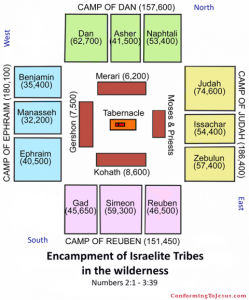Moses asks God to allow him to enter the land, and God says, pretty much, “Enough already! Stop whining about this because I told you that ain’t gonna happen! But, I will do this- after you anoint Joshua climb up to the top of Mount Pisgah, and I will let you see the land.”
Some believe, as I do, that not only did God show Moses the land, but also the future. He showed Moses the eventual degradation of the people into idol worship, the consequent dispersal into the Diaspora and exile to Babylon, ending with their return to Israel. I believe this because of the warning Moses gives right after he observes the land, which is not so much the warning of a possible future as it is the narration of events from one who has seen it happen.
This rest of this parashah holds nearly everything that is important to the Jewish people, and thereby the world:
Deuteronomy 5:6-19: Moses reviews the Ten Commandments;
Deuteronomy 6:4: Moses teaches us the Shema;
Deuteronomy 6:5-10: Moses teaches us the V’ahavta;
Deuteronomy 6:16: Moses teaches us a lesson that is used more often in Christianity (from my experience) than in Judaism: Do not test the Lord, your God.
Clearly, there is in just those 4 lessons more than I could write in a single post, unless that post was something like 15 pages or more. Don’t worry- this won’t be.
Actually, the message I have today is not about any of those passages. It is from Deuteronomy 4:5-8, which is what Moses told the people before he told them all those other things:
See, I have taught you statutes and rules, as the Lord my God commanded me, that you should do them in the land that you are entering to take possession of it.Keep them and do them, for that will be your wisdom and your understanding in the sight of the peoples, who, when they hear all these statutes, will say, ‘Surely this great nation is a wise and understanding people.’ For what great nation is there that has a god so near to it as the Lord our God is to us, whenever we call upon him? And what great nation is there, that has statutes and rules so righteous as all this law that I set before you today?
I often state that the Torah is not just for the Jews, but for the entire world. The Jews received it so to learn it and live it (just like it says here), so that they may be an example to the world.
Shaul says pretty much the same thing, but to a different audience, in Romans 11:11–
So I ask, did they stumble in order that they might fall? By no means! Rather, through their trespass salvation has come to the Gentiles, so as to make Israel jealous.
Moses is telling Israel to obey Torah so that when the other nations see the wonderful rulings, peacefulness, social closeness, morality and compassion of the people, and how God is always close at hand to help and protect them, they will be jealous and want to be part of it. And Shaul, some 1500 or so years later, tells the Messianic communities that their living in faith to Messiah Yeshua will eventually be an example to the non-believing Jews how much better it is to accept Yeshua and make them jealous for their own Messiah.
Here we have the same message– faithfully believe God and do as He says– being told to Jews and Gentiles first going into the land, and centuries later to Gentiles and Jews who have been living in the land. And the reason is the same: to incite, through jealousy, those living outside of God’s plan to choose to accept God (and His Messiah.)
There are many passages in the bible that confirm this message, and it is unfortunate that much of Christianity has perverted and misused the writings of Shaul to dissuade people from hearing the proper message. Shaul says he is delivering the Gospel to the Jew first, then the Gentile (Romans 1:16); I believe this means if the Good News of the Kingdom of God is not presented in a way that is acceptable to a Jewish person, it isn’t the correct message for a Gentile.
Still and all, we can be confident in this: God’as plan will win out in the end! Torah will be written on our hearts (Jeremiah 31:33) and we no longer ask our brother (and sister) if they know the Lord, because all will know Him.
In the meantime, what should we do? Well, it’s obvious, isn’t it? Live your life as an example to those who have rejected God and/or Messiah Yeshua to show them how blessed and peaceful it is to be living as God has told us we should.
Most everyone knows that God’s house has many rooms, but what many don’t know is that there is a really big pool in the backyard, which is always refreshing, so to you who are suffering the emptiness, despair, heat and discomfort of living a worldly life…C’mon in- the water’s fine!!!

